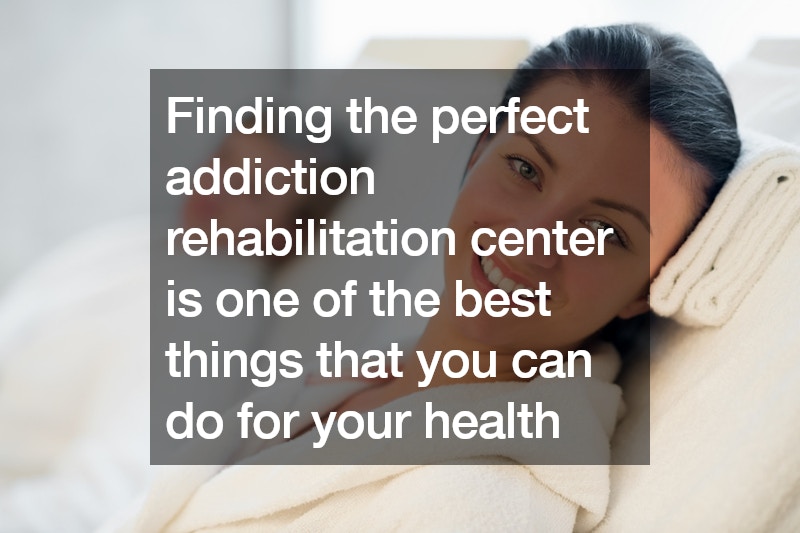

Finding the perfect addiction rehabilitation center is one of the best things that you can do for your health. It can also benefit those who love you because they won’t have to deal with the worries that they’re sure to experience when you have a habit. It’s no secret that there are many reasons to go to rehab, and if you’re going to do it, the first step is to find the right rehab. There, you’re going to find good rehabilitation professionals who can tell you all about rehabilitation benefits and motivate you to do your best to kick your habit.
You can start your journey to a better version of yourself by doing some research of your own. Look for the answer to “What is the goal of rehabilitation?” and more on the internet. This will give you a good idea of what you should expect and may make it easier for you to take this important step. You can also find some tips to stay committed to the process and emerge better at the other end. For this, you can work with the people who care for you, since you may need their backing in order to be able to do what it takes.

Realizing that your casual drug usage isn’t actually all that casual and you need help is a very brave and terrifying step to take. The fact is, no matter how incredibly strong you are, your addiction is bigger than your will power. There is nothing to be ashamed of if you don’t have the inner determination to choose not to be an addict — in reality, that’s not a thing. Your addiction isn’t just a matter of mind over matter. When you are addicted to a controlled substance, your brain isn’t able to produce the chemicals it needs to operate your entire body on its own. You depend on your drug of choice to function, it is a physiological dependency. Just like you can’t will yourself not to have cancer, when your body is physically dependent on drugs or alcohol, seeking drug rehab support offers you the best chances of recovery. So if you’ve acknowledged that inpatient drug rehab might be the only chance you have to beat your addiction, you’ve already overcome a huge hurdle in the drug rehab process.
However, you’re only chance of success relies on understanding that your work has only begun. There is no “magic cure” for drug addiction. Some drug rehab centers might claim that they offer medications or medical procedures that give you an easy fix for your drug dependency, but you should consider this a red flag. Drug addiction is a lifelong condition, even after you’ve been clean for years and decades, it’s something you’ll need to be cognizant of. This is why the inpatient drug rehabs that are worth the time of money not only treat the physical withdrawals that are associated with detox, they also help you establish the lifelong tools you need to stay clean.
In some ways, you could view inpatient drug rehab as a three-phase process:
The Two Essential Phases of an Effective Inpatient Drug Rehab
- Detox
As we’ve mentioned, a serious part of drug addiction is the physical dependency on your drug of choice. When you use a drug, it forced your brain to alter the delicate balance of chemical levels that you need to function. When the drug wears off, you have opposite effect on the chemical levels in your brain, which makes you feel awful until your next high. After continual use, the impact of the lows is far more profound than the highs.
Let’s say you decide to make positive changes and quit your drug habit cold turkey. Suddenly, your body has none of the forced regulation of chemicals that it’s grown dependent on just to behave normally. Your body might handle its new absence of chemical enhancers by revolting against you. Irritability, migraines, seizures, anxiety, and depression are all symptoms doctors see during detox.
The methods used to get you through detox might include medication that help reduce the symptoms you experience during detox, it might involve measures to boost your health so that you can withstand the difficult days, it might involve medication that make you “out of it” so you aren’t aware of the hardship you’re experiencing. The correct approach for you depends on your temperament and needs. - Therapy
While you might be genetically predisposed to have a strong inclination to addiction, you didn’t accidentally take your first hit of the drug that now plagues you. Something led to you the needle or pipe or pill that has destroyed your life. In your recovery process, it is critical to understand what experiences and emotions triggered your dependency on drugs, so you can process them in a healthy manner, and learn to cope. This might be a painful process, as many of the circumstances that led you to where you are today are deeply excruciating to dig up, but without acknowledging the pain, you can’t learn healthier ways to channel it.
After helping you get through the physical withdrawals of detox, a good inpatient drug rehab will give you daily therapy to help you process the emotional and mental factors that contribute to your dependency. You might meet with a therapist on a daily basis, and you will likely have group sessions that include other recovering addicts. This is an important part of drug rehab.
Do you have questions? Share below!

